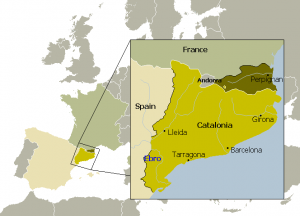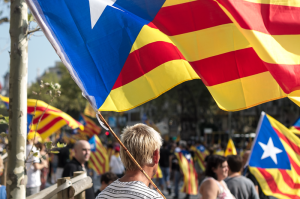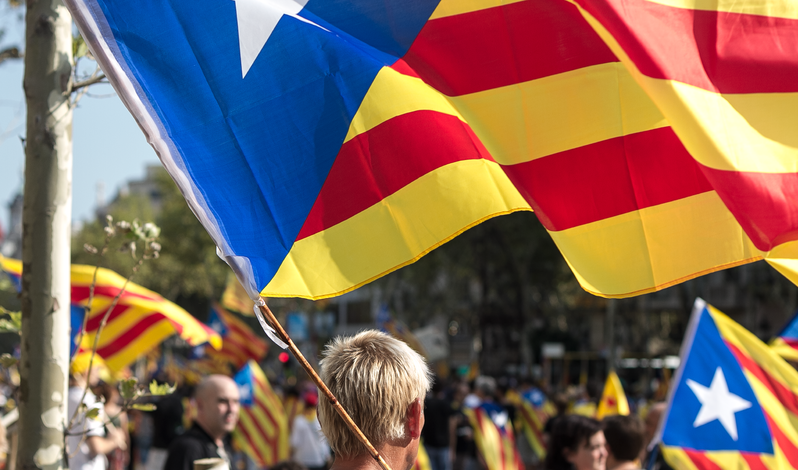Editor’s note: This week, BPR Global is excited to feature two guest columnists weighing in on a pressing global issue — the persistence of the Catalan independence movement. Today’s column is written by Brown ’13 graduate and former BPR contributor and Global Managing Editor Jorge Tamames.
The human chain stretched across the whole of Catalonia. 1.6 million protesters held hands along 400 kilometers, from the French Pyrenees in the north to the southern border with Valencia. It was September 11th and this day, as in the U.S. and Chile, commemorates a tragic event: the siege and fall of Barcelona during the War of the Spanish Succession.
But September 11th is also Catalonia’s National Day, and the human chain was there as a powerful symbol of the region’s bid to become independent from Spain. While an integral part of the latter for the past five centuries, Catalonia’s language, culture, political institutions, and early history are markedly different from those of the rest of Spain. As a result, the question of Catalan sovereignty (or lack thereof) has been a recurring source of tension for the past two centuries of Spanish history. This year’s demonstration, scheduled on the 299th anniversary of Barcelona’s fall to Castilian and French — read foreign — troops and echoing the 1989 Baltic Way, was masterfully executed to present the Catalan nation’s immemorial suffering under Spain’s yoke.
Is it true? Does the Spanish state constitute an existential threat to Catalonia? Is military occupation imminent? Will Catalans become Europe’s Palestinians — and Castilians the Serbs of Spain?

The answer is no. Spain ranks among the OCDE’s most decentralized states and Barcelona’s Generalitat, currently controlled by Catalan nationalists, safeguards the region’s autonomy. Holding the country together by force remains an extremely unlikely outcome that a relieving majority of Spaniards rejects.
Nevertheless, the protest should not be ignored. When Spain transitioned from Francisco Franco’s dictatorship to democracy, an overwhelming majority of Catalans voted in favor of a common (i.e. Spanish) Constitution that devolved power to their region. Four decades later, secessionists outnumber unionists in Catalonia. This contrast should concentrate the mind of policymakers in Madrid — how and why have the views of Catalan society shifted so dramatically?
Catalonia’s bid for independence is in great measure a reflection of and reaction to the crisis that currently engulfs Spain. Like it or not Catalan politics are articulated in reference to those of the rest of the country, and besides economic hardship Spain is undergoing a full-blown political crisis. Its leading political parties are increasingly unpopular; government and opposition are mired in corruption scandals; the legislative branch of government is viewed as little other than the executive’s yes-man; even King Juan Carlos has become an institutional liability instead of an asset. In the words of a leading researcher, “[Spanish society] has become orphaned of political, economic, and social leadership, right in the middle of the worst crisis in living memory.” And then there is the mayor of Madrid.
Under these circumstances it was only a question of time before the perennial quagmire of Spain’s territorial organization resurfaced. And in a country with such bleak prospects, secession has automatically gained traction as an inspiring political project. None of this is to understate the importance of desires for independence in and of themselves, but to stress that the whole of Spain is an active element in this play.
A case in point is the present vindication for a 2014 referendum on Catalonia’s independence. Prime Minister Mariano Rajoy, renowned for little other than his capacity to ignore political pressure, has buried his head in the sand and let his conservative Popular Party (PP) spend the past year threatening to roll back Catalonia’s state rights — and thus actively fuel secessionism. PP claims the Constitution does not allow for the referendum to take place, so desiring one is pointless despite the fact 80% of Catalans do.

There is more to this attitude than a legalistic catch-22. At the heart of the regime engineered after Franco’s death is the 1978 Constitution, long viewed as the jewel in the crown of a model third-wave democracy. But recession, unemployment, and corruption have undermined the allegedly paradigmatic qualities of Spanish democracy. It is becoming all too clear that the latter was crafted against the backdrop of the military’s saber rattling — there was even a Spanish al-Sisi, whose failed coup Washington dutifully supported — that the Constitution reflects this conservative bias and the post-Franco democratic regime should be reformed, all the more so because much of Spain’s political crisis largely results from its institutional shortcomings. But this is not something PP, with its Francoist origins and tepidness toward the dictatorship, is willing to do. Its elites view the Constitution as set in stone and incapable of accommodating Catalan demands.
Their position is a weak one. The Constitution is no monolith; both PP and the center-left PSOE amend it whenever Brussels demands they do. Nor is the government’s intransigence surprising. In 2006 PP forced the watering down of a Catalan Statute of Autonomy that would have satisfied the region’s aspirations to self-government. In the aftermath of its evisceration secessionist demands soared, fueled by the impression that Spain would never understand or tolerate Catalan aspirations. Today’s impasse reinforces the stereotype of Spain as a reservoir of unrepentant Francoists…and as long as Madrid refuses to budge, time will remain on the secessionists’ side.
The only way to avoid crossing a point of no return is to recognize the present state of affairs as untenable. A comprehensively reformed Constitution should, among other things, recognize Catalonia as a nation and pave the way for the referendum to take place. Given its outcome is still unclear (when faced with the fact that Catalonia would be expelled from the EU and leave the common currency, unionists become a plurality), Madrid should emulate London and give secessionists enough rope to hang themselves — or to become independent.
As someone who lacks sympathy for nationalism regardless of the flag in question, I would prefer the country to remain united. I fear a rump Spain and an independent Catalonia would only become provincial and irrelevant parodies of their somewhat provincial and irrelevant former country. But the ongoing gridlock cannot go on indefinitely. And I doubt Spain will survive as a single country, much less an inspiring political project, if it fails to reform its ailing democracy.

Excelent analysys!
Spain is decentralized administratively but it is not the federal and much less confederal state. There is no fiscal autonomy and the Constitutional court is always partial in favor of a conception of Spain as Castilian nation in contrast to the Catalan one, Basque or Galician.
I believe the Spanish understand a uniform Spain nationally and this prevents Spain from being able to change.
They take 299 years looking of creating a Spain uninacional. Most of the time without democracy and without with respect to the diversity. Too much time to change
The Catalans we think that we can live better without Spain and I think that Spain also will live better if it is only one nation.
As a Catalan, I want to congratulate the author. I do not agree with most of his views, but he has been able to keep his head remarkably cool in the midst of the general hot-headedness that is today’s Spanish media.
I am a Catalan who is in favour of independence. I would have never thought I would find myself in this position but I am now. The main reason for this is that facts over the last few years have convinced me that there is no possible way in what Spain can become the country I want to live in (modern, respectful of the different cultures that live in it…)
I understand that most people (specially in the rest of Spain), although share my goals, do not agree with my pessimist analysis. What I cannot understand in any way is how can they be so quiet in the present moment. Catalana people are asking to vote to decide their future and the only answer we are getting are all types of threats. We have been called nazis, we have been told that we have no right to decide our future, that we should just shut up and sit down. Where are the Spanish people that believe in democracy? Even if we do not agree, we should at least recognise the other’s person rights to have a say on what is to be their future, to express collective will by voting.
Thank you Mr Tamames, we need more people to disagree with us in the way you do. We can discuss with you and we can find a solution. I just hope it is not late and that your voice does not get drowned by the fanatical cries of those who think that voting is something that nazis did.